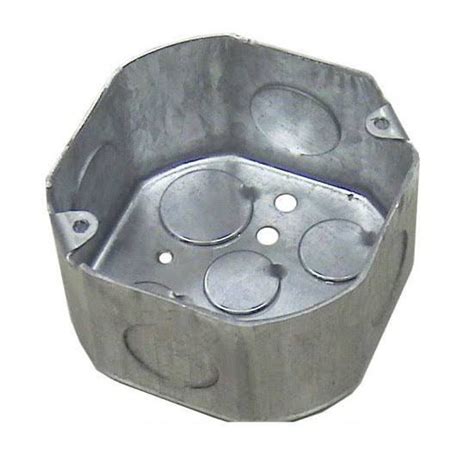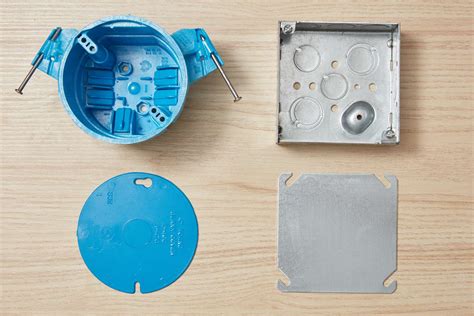electrical box metal vs plastic Metal boxes are a good choice for high-current applications, while plastic boxes are more suitable for corrosive or damp environments. Plastic electrical boxes are the most common type of . This blog post will give a rundown of the five common bracket styles and their ideal use cases, in order to help you in your design decisions. Before we dive into the different styles of bracket we offer, two quick tips.
0 · wiring plastic electrical box knockouts
1 · the metal junction box
2 · plastic outlet box vs metal
3 · plastic or metal electrical boxes
4 · plastic junction boxes electrical lowe's
5 · metal vs plastic gang box
6 · grounding metal electrical boxes
7 · are metal electrical boxes safe
I never worried about it myself, but a customer idly asked a question in passing about whether the holes in the back of a 1900 box are a problem when it comes to containing any sparks or a fire inside.
Use a metal electrical box when metal-sheathed cable (also called armored BX cable) or metal conduit runs in or out of the box. Metal cable and conduit depend on the contact from its metal sheathing to the metal box to complete grounding.NM wire: NM (non-metallic) wire is electrical wire with an outermost sheathing made .BX is a name for metal-armored electrical cable for indoor or outdoor use. What .Knockouts are the little metal discs covering the holes in the sides or back of a metal .
Metal boxes are a good choice for high-current applications, while plastic boxes are more suitable for corrosive or damp environments. Plastic electrical boxes are the most common type of . Electrical boxes come in two primary materials: plastic and metal. Plastic junction boxes are lightweight, affordable, and resistant to corrosion. They are suitable for dry environments. Metal junction boxes are more durable, they .
In use for far longer than PVC versions, metal electrical boxes are super-strong, fireproof, and incapable of melting. They offer the greatest level of security for electrical wiring applications. It's also virtually impossible to crush . Plastic boxes are lightweight, easy to work with, and suitable for non-metallic cables. They are a popular choice for DIYers. On the other hand, .

Metal and plastic are the most common materials used to construct electrical boxes. Metal boxes are primarily made from steel, aluminum, or cast iron, while non-metallic boxes use PVC or fiberglass. Is it beneficial to replace . Discover the pros and cons of plastic vs metal junction boxes. Learn which is better for your electrical projects based on durability, safety, and cost. Metal Junction Box: Metal junction boxes are more long-lasting as they have high melting points ( from 660°C to 1,538°C ) and are stronger than plastic boxes so, they can be used long-term. Plastic junction boxes are not so .
Most do-it-yourselfers prefer plastic electrical boxes, while electricians use both metal and plastic boxes. Metal electrical boxes were used long before plastic (PVC) electrical boxes were introduced to the market. Use a metal electrical box when metal-sheathed cable (also called armored BX cable) or metal conduit runs in or out of the box. Metal cable and conduit depend on the contact from its metal sheathing to the metal box to complete grounding. Plastic device boxes offer several advantages over metallic device boxes. For instance, unlike metal boxes, plastic electrical boxes do not conduct electricity upon contact with a live wire, eliminating the need for grounding.
Metal boxes are a good choice for high-current applications, while plastic boxes are more suitable for corrosive or damp environments. Plastic electrical boxes are the most common type of electrical box. They are made from a variety of materials, including PVC, . Electrical boxes come in two primary materials: plastic and metal. Plastic junction boxes are lightweight, affordable, and resistant to corrosion. They are suitable for dry environments. Metal junction boxes are more durable, they are fire resistant and are used for wet or high-temperature areas. When To Use A Plastic Electric Box?

In use for far longer than PVC versions, metal electrical boxes are super-strong, fireproof, and incapable of melting. They offer the greatest level of security for electrical wiring applications. It's also virtually impossible to crush or bend a metal junction box!
Plastic boxes are lightweight, easy to work with, and suitable for non-metallic cables. They are a popular choice for DIYers. On the other hand, metal boxes offer unmatched strength, durability, and compatibility with metal-sheathed cables or conduits, making them ideal for specific applications. Metal and plastic are the most common materials used to construct electrical boxes. Metal boxes are primarily made from steel, aluminum, or cast iron, while non-metallic boxes use PVC or fiberglass. Is it beneficial to replace the metal electric box with plastic? Discover the pros and cons of plastic vs metal junction boxes. Learn which is better for your electrical projects based on durability, safety, and cost.
wiring plastic electrical box knockouts
Metal Junction Box: Metal junction boxes are more long-lasting as they have high melting points ( from 660°C to 1,538°C ) and are stronger than plastic boxes so, they can be used long-term. Plastic junction boxes are not so sturdy, so not suitable for outside areas.
Most do-it-yourselfers prefer plastic electrical boxes, while electricians use both metal and plastic boxes. Metal electrical boxes were used long before plastic (PVC) electrical boxes were introduced to the market. Use a metal electrical box when metal-sheathed cable (also called armored BX cable) or metal conduit runs in or out of the box. Metal cable and conduit depend on the contact from its metal sheathing to the metal box to complete grounding. Plastic device boxes offer several advantages over metallic device boxes. For instance, unlike metal boxes, plastic electrical boxes do not conduct electricity upon contact with a live wire, eliminating the need for grounding.
Metal boxes are a good choice for high-current applications, while plastic boxes are more suitable for corrosive or damp environments. Plastic electrical boxes are the most common type of electrical box. They are made from a variety of materials, including PVC, .
Electrical boxes come in two primary materials: plastic and metal. Plastic junction boxes are lightweight, affordable, and resistant to corrosion. They are suitable for dry environments. Metal junction boxes are more durable, they are fire resistant and are used for wet or high-temperature areas. When To Use A Plastic Electric Box? In use for far longer than PVC versions, metal electrical boxes are super-strong, fireproof, and incapable of melting. They offer the greatest level of security for electrical wiring applications. It's also virtually impossible to crush or bend a metal junction box! Plastic boxes are lightweight, easy to work with, and suitable for non-metallic cables. They are a popular choice for DIYers. On the other hand, metal boxes offer unmatched strength, durability, and compatibility with metal-sheathed cables or conduits, making them ideal for specific applications. Metal and plastic are the most common materials used to construct electrical boxes. Metal boxes are primarily made from steel, aluminum, or cast iron, while non-metallic boxes use PVC or fiberglass. Is it beneficial to replace the metal electric box with plastic?
Discover the pros and cons of plastic vs metal junction boxes. Learn which is better for your electrical projects based on durability, safety, and cost. Metal Junction Box: Metal junction boxes are more long-lasting as they have high melting points ( from 660°C to 1,538°C ) and are stronger than plastic boxes so, they can be used long-term. Plastic junction boxes are not so sturdy, so not suitable for outside areas.
the metal junction box

A breakaway rope is attached to the steer and stretched across the open end of the box. When the steer reaches the advantage point, the barrier is released and cowboys take off. Breaking the barrier costs them a 10-second penalty. Bronc:A horse that has been bred to buck. Broncs are used in bareback riding and saddle bronc riding events.
electrical box metal vs plastic|are metal electrical boxes safe